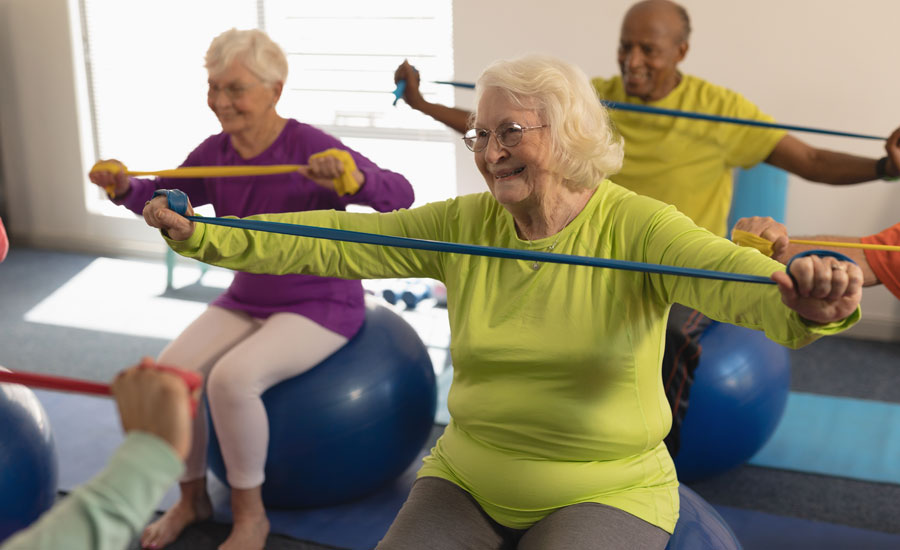Inside a Care Home – Daily Life Revealed

Most people think life in a care home is dull, with nothing to do but sit around. These days, care homes prioritise residents’ lives, enriching them with a wide variety of activities and projects, ensuring residents stay active, engaged and social to keep life interesting and fulfilling. No two days are the same, and the range of activities ensures everyone can find something they enjoy. Keep reading to learn all about daily life in a care home.
What Are the Daily Activities in a Care Home?
From creative workshops to day trips, there’s something for everyone to enjoy each day, offering variety and a sense of fulfilment:
- Morning stretches and light exercise – Gentle activities to get the body moving, like chair yoga, sitting aerobics or guided stretching.
- Communal meals – Residents gather for breakfast, lunch and dinner, which doubles as a social occasion to catch up with others.
- Creative workshops – Flower pressing, knitting circles or painting sessions allow creative expression.
- Social games – Bingo, card games or quizzes to foster a lighthearted sense of fun and friendly competition.
- Personal time – Residents have time to relax, read, visit an on-site salon or pursue individual hobbies in their own space or communal areas.
- Day trips and outings – Regular off-site shopping trips for a change of scenery and fresh air.
- Evening entertainment – Film nights, shows or group discussions to wind down and enjoy the evening together.
Creating Friendships and Community in a Care Home
Social interaction is the core of care home life for connection. Most, if not every, home has a communal dining area to unite everyone, making mealtimes a social occasion rather than just a routine part of the day.
Group activities like outdoor or indoor games, quizzes or arts and crafts, like knitting and painting, are fun ways for residents to get to know each other and create bonds. Good care homes also organise regular events like old movie nights, birthday parties or live music performances, creating plenty of opportunities for residents to socialise and enjoy shared experiences.
Not all residents will want a full-on activity schedule every day. For those who prefer more personal interactions, quiet chats over tea, coffee or wine in the lounge or time spent with new friends during a walk are just as important.
Gentle Movement for a Healthier, Happier Residents
Staying active is essential for physical and mental well-being, and care homes offer plenty of options to keep residents moving in ways that suit their abilities.
Gentle exercise classes like yoga or walking are a great way to maintain flexibility and strength.
Group activities like chair volleyball, bowling or dance lessons turn fitness into a social event, making staying active more fun and interactive. Care homes often have dedicated staff for physical activities who tailor them to individual abilities, ensuring that everyone can participate in a way that feels comfortable and energised.
Personal Time for Relaxation and Connections
Alone time is just as important in a care home daily routine, allowing residents to unwind and enjoy their favourite hobbies or pastimes.
Whether getting lost in a book, listening to some tunes or resting in a quiet corner, residents can spend time as they choose. Most care homes have private bedrooms for a peaceful space, while bustling communal spaces are always available for those who prefer a bit of company.
Visitors are always welcome and most homes have flexible visitation policies with no limits to when family can call in. Spending time with family and friends adds another layer of comfort and connection. Whether it’s a casual visit over a brew or sharing a meal, these moments provide an important link to life outside the care home.

Nurturing Well-Being Every Day
Care home staff are there to provide physical care and offer companionship and a friendly ear, ensuring residents feel safe, understood and valued. Whether it’s a quick chat during the day or someone to turn to during more challenging moments, staff members are trained to provide comfort and reassurance.
In addition to the personal connection with staff, many care homes offer group therapy sessions, mindfulness activities and relaxation techniques to help residents manage stress or anxiety. As mentioned earlier, regular family visits also play an essential role in maintaining emotional well-being, offering the chance to stay connected with loved ones.
Thriving in a Community that Cares
With activities that stimulate the mind, social opportunities that build camaraderie and meaningful connections and the emotional and physical support needed to live comfortably, each day offers something new. Care homes are no longer places where residents have nothing to do. They’re a home away from home where they are supported, stay active and feel part of a community.
Ready to explore...
